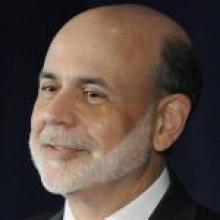
While warning of significant risks to the already weak US economy, the Fed said it would sell $US400 billion ($NZ486 billion) of short-term Treasury bonds (treasuries) to buy the same amount of longer-term government debt.
The purchase will help push up prices of long-term treasuries. In response, their yields will fall. So will those for other loans.
The operation has been labelled "Operation Twist", and employs a strategy first used in 1961 (and named after the Twist dance craze of the time).
Craigs Investment Partners broker Chris Timms said Operation Twist was unlikely to spur much economic growth since low borrowing costs did not not seem to be the problem.
"This is a short-term solution to the extent that interest rates are already extraordinarily low and yet borrowing is sluggish."
The emphasis on driving down longer-term rates was an attempt to get mortgage borrowing and capital spending going much faster, he said.
However, US businesses were already cash rich and it was not interest rates that were stopping them from hiring or investing more.
Companies were uncertain about the direction of the economy and demand was not growing fast enough to require greater job growth.
The Fed said in a statement that recent indicators pointed to continuing weakness in overall labour market conditions while the unemployment rate remained elevated.
"There are significant down-side risks to the economic outlook, including strains in global financial markets."
In addition to rebalancing its portfolio, the Fed has intensified its efforts to shore up the housing market by pledging to reinvest proceeds from maturing housing-related debt it holds back into the mortgage market.
Reuters reported that the Fed's actions might not have a great impact, even if they did lower long-term interest rates.
Still facing a 9.1% unemployment rate and an escalating sovereign debt crisis in Europe, Fed officials felt they needed to do what they could to try to breathe more life into the US economy.
The economy grew less than 1% on an annual basis in the first half of the year, slightly lower than New Zealand's 1%.
Fed chairman Ben Bernanke has proved reluctant to stay out of the market and has become a target for politicians leading up to next year's election.
Top Republican lawmakers wrote to Mr Bernanke this week, urging the central bank to resist further economic intervention.
However, the Fed is not alone.
The Bank of England indicated on Wednesday it was ready to pump more money into the weakening British economy. Norway's central bank signalled it might refrain from rate increases for longer than previously expected.
The European debt problems and other global risks meant New Zealand Reserve Bank governor Alan Bollard was in no hurry to raise the benchmark official cash rate (OCR), he told a conference in New York yesterday.
"At the moment we are not being particularly impacted in the short term by these risks, but we are a big global trader and we know that when Lehman's happened on this side of the world in 2008 we had about 30 seconds before it hit New Zealand," Bloomberg Newswire reported Dr Bollard as telling the Euromoney conference
Operation Twist
In 1961, just weeks after the inauguration of President John F. Kennedy, the Federal Reserve took similar steps to the ones announced yesterday. It named its programme Operation Nudge, the idea being to nudge long-term rates lower.
But at the time, Chubby Checker's record The Twist was all the rage, and the name "Operation Twist" stuck instead. Checker had performed the song on American Bandstand in July 1960, and it hit number 1 later that year.











